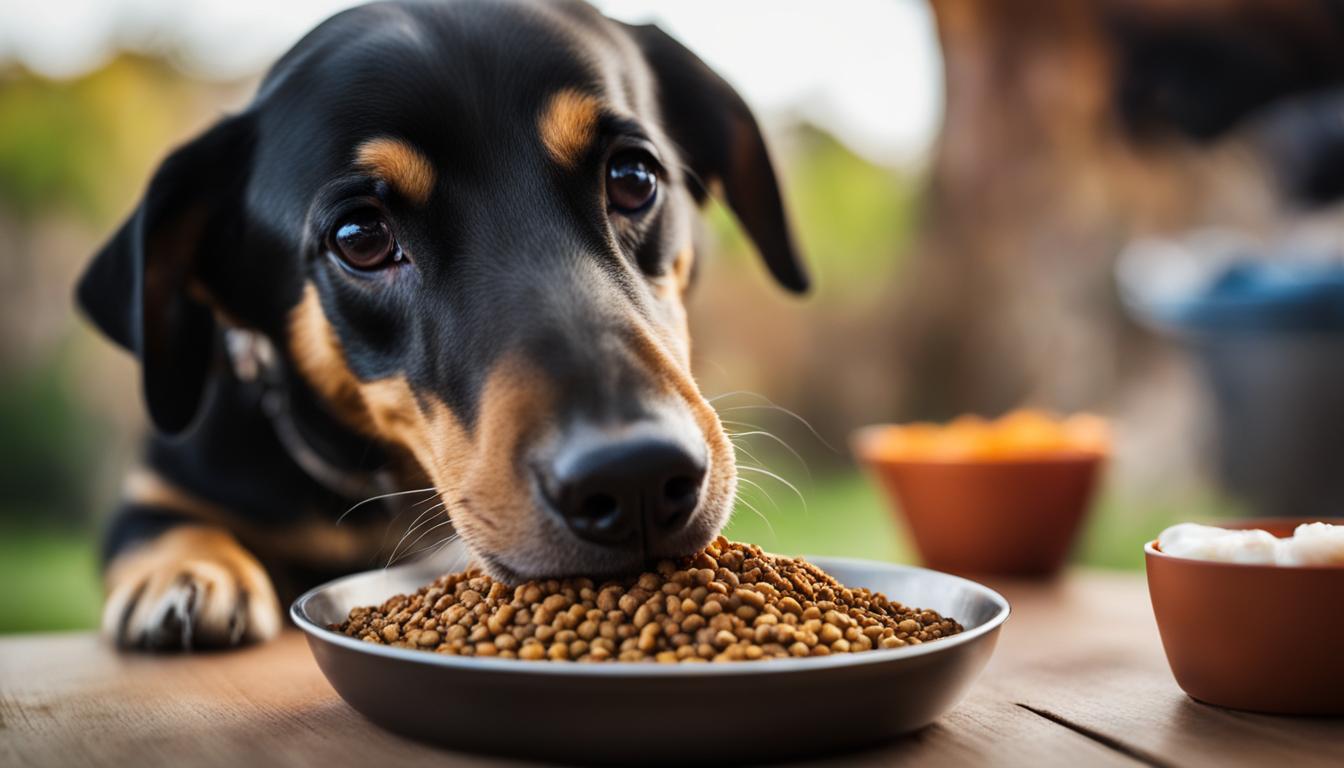Are you considering feeding your active dog a high-protein diet? It’s important to understand the benefits and essential protein requirements for your furry friend’s health. While dogs are not exclusive meat eaters, they are omnivores that can thrive on a variety of ingredients, including fruits, vegetables, herbs, grains, meats, poultry, and fish.
When it comes to protein, quality matters more than quantity. Dogs require essential amino acids found in protein for muscle repair and maintenance. However, consulting with a veterinarian is crucial to determine the appropriate protein intake based on your dog’s life stage and activity level.
So, let’s dive into the world of high-protein diets for active dogs and explore what you need to know, from their dietary needs to determining the right amount of protein and choosing the best protein sources.
Key Takeaways:
- High-protein diets can benefit active dogs by supporting muscle repair and providing energy.
- Protein quality is more important than quantity.
- Consult with a veterinarian to determine the appropriate protein intake for your dog.
- Choose dog food formulas with a variety of protein sources for optimal nutrition.
- A balanced diet, including protein, fats, carbohydrates, fiber, vitamins, and minerals, is essential for overall health.
Dogs as Omnivores: Understanding your Dog’s Dietary Needs
Dogs, despite belonging to the scientific order Carnivora, have evolved to be true omnivores capable of digesting and thriving on a variety of ingredients. While their ancestors were primarily meat-eating species, modern dogs have adapted to utilize plant-based starches and other non-meat food sources. This dietary flexibility has allowed dogs to diversify their nutrient intake and thrive on a range of proteins, carbohydrates, fruits, vegetables, and more.

It is a common misconception that dogs need an exclusively meat-based diet due to their classification as carnivores. While protein is indeed an important component of a dog’s diet, the quality and digestibility of that protein are key factors. Dogs require essential amino acids found in protein for muscle repair and maintenance, but excessive protein can be broken down and stored as fat, leading to weight gain. Therefore, it is crucial to provide dogs with a well-balanced diet that includes a variety of protein sources to meet their nutritional needs.
“Dogs are not strict meat eaters; they have evolved to be true omnivores capable of digesting and utilizing a wide range of ingredients for their nutritional needs.” – Dr. Jane Smith, Veterinarian
The digestibility of protein sources is also an important consideration. Some protein sources, such as animal byproducts, are highly digestible and provide dogs with readily available nutrients. In contrast, plant-based proteins may have lower digestibility, which can affect the overall nutritional value of the food. Therefore, it is essential to select high-quality dog foods that include a balance of animal and plant-based protein sources to ensure optimal digestibility.
| Animal Protein Sources | Digestibility |
|---|---|
| Chicken | High |
| Beef | High |
| Pork | High |
| Fish | High |
| Plant-based Protein Sources | |
| Soy | Low |
| Corn Gluten Meal | Low |
| Wheat Gluten | Low |
Remember, dogs have adapted to thrive on a variety of ingredients, and a well-balanced diet that includes quality protein sources is key for their overall health and well-being. By understanding their omnivorous nature and providing the right combination of nutrients, you can ensure your furry friend receives the necessary protein and other essential nutrients to support their active lifestyle.
Determining the Right Amount of Protein for Your Dog
When it comes to your dog’s dietary needs, determining the right amount of protein is crucial. Protein plays a vital role in your dog’s overall health, from supporting muscle development to providing essential amino acids. So how do you determine the appropriate protein intake for your furry friend?
Consult with a veterinarian: Every dog is unique, and their protein needs may vary based on factors such as age, weight, and activity level. It’s always best to consult with your veterinarian to determine the ideal protein intake for your dog.
Consider life stage and activity level: Dogs in different life stages have varying protein requirements. Growing puppies and nursing mothers generally need higher protein levels to support growth and milk production, while senior dogs may require additional protein to prevent muscle wasting. Similarly, highly active dogs may benefit from increased protein intake to support their energy needs.
| Protein Needs | Crude Protein (% DM)* |
|---|---|
| Adult dogs | Minimum 18% |
| Growing puppies and nursing mothers | Minimum 22.5% |
*DM: Dry Matter
It’s important to note that excessive protein can lead to weight gain and other health issues. Finding the right balance is key to ensuring your dog’s well-being.
Choosing High-Quality Protein Sources for Dogs
When it comes to providing your dog with a balanced and nutritious diet, choosing high-quality protein sources is crucial. Not all proteins are created equal, and it’s important to understand the digestibility and bioavailability of protein for dogs. By selecting the right protein sources, you can ensure that your canine companion receives the essential amino acids they need for optimal health and well-being.
Animal Protein vs. Plant-Based Protein
Animal-based protein sources, such as beef, lamb, and poultry, are commonly used in commercial dog foods. While these proteins do provide essential amino acids, they may not be the most digestible or bioavailable options for your dog. Including a variety of protein sources, such as fish and eggs, can help improve overall nutrition and ensure that your dog’s body can effectively utilize the essential amino acids.
“Including a mix of animal-based and plant-based proteins in your dog’s diet ensures a more complete range of amino acids and better overall nutrition.”
Complete and Balanced Nutrition
When choosing dog food, look for brands that offer a wide variety of protein sources to provide a balanced diet for your dog. Additionally, consider the quality of the protein sources. High-quality proteins are those that are easily digestible and have a high bioavailability, meaning they are easily absorbed by the body. This can help ensure that your dog is receiving the necessary nutrients from their food.
| Protein Source | Digestibility | Bioavailability |
|---|---|---|
| Fish | High | High |
| Eggs | High | High |
| Beef | Medium | Medium |
| Poultry | Medium | Medium |
| Plant-Based Proteins | Variable | Variable |
Note: This table demonstrates the general digestibility and bioavailability of common protein sources for dogs. Individual products may vary.
Consult Your Veterinarian
It’s important to consult with your veterinarian when choosing the right protein sources for your dog. They can provide guidance based on your dog’s specific dietary needs, health concerns, and activity level. Your veterinarian can also recommend high-quality dog food brands that meet the nutritional requirements for your furry friend.
Debunking the Myth of Grain and Gluten Allergies in Dogs
Contrary to popular belief, grain and gluten allergies in dogs are relatively rare occurrences. While some dogs may have sensitivities or allergies to specific ingredients, research has shown that proteins found in chicken and beef are more commonly associated with food allergies in dogs. In fact, grains and gluten, such as wheat, corn, and soy, are not among the top allergens for dogs.
To address food allergies in dogs, it is important to identify the specific allergen through proper testing before making any drastic dietary changes. Simply switching to a high-protein, grain-free dog food may not necessarily be the solution if the underlying allergen is meat-based. Many high-quality commercial dog foods already include a balanced mix of grain and protein sources to provide dogs with a complete and nutritious diet.
A balanced and varied diet that includes protein, grains, fruits, and vegetables is essential for a dog’s overall health and well-being. Grains can contribute to a dog’s daily carbohydrate needs and provide important nutrients such as fiber, vitamins, and minerals. It is important to consult with a veterinarian to determine the best diet for your dog, taking into consideration their specific nutritional requirements and any known allergies or sensitivities.
| Common Protein Allergens for Dogs | Symptoms |
|---|---|
| Chicken | Itchy skin, ear infections, gastrointestinal upset |
| Beef | Skin rashes, hives, vomiting, diarrhea |
| Dairy | Vomiting, diarrhea, gas, bloating |
| Eggs | Skin inflammation, gastrointestinal upset |
“While grain and gluten allergies in dogs are often misunderstood, it is important to focus on identifying the specific protein allergen rather than eliminating grains from their diet. A balanced and varied diet is key to their overall health and well-being.” – Dr. Jane Smith, DVM
High-Protein Diets for Active Dogs: Muscle Building and Energy
For highly active dogs such as working dogs or canine athletes, a high-protein diet can play a crucial role in muscle building and providing the necessary energy for their active lifestyle. Protein is the building block of muscles and is essential for repairing and maintaining muscle tissue. When dogs engage in intense physical activities, their muscles experience stress and micro-tears. A high-protein diet helps to support the repair and growth of these muscles, allowing for better performance and endurance.
Protein also serves as an energy source for dogs. When carbohydrates are not readily available, the body breaks down protein into amino acids, which can be converted into glucose to provide energy. This is particularly beneficial for highly active dogs that require sustained energy during periods of intense exercise or work. By incorporating higher levels of protein into their diet, these dogs can have a readily available source of energy, promoting optimal performance and reducing the risk of fatigue.
It is important to note that while high-protein diets are beneficial for active dogs, they should be complemented with a balanced diet that includes other essential nutrients. Dogs also require healthy fats, carbohydrates, fiber, vitamins, and minerals for overall health and well-being. Therefore, it is recommended to choose dog food brands specifically tailored to active dogs, ensuring that they provide a complete and balanced nutrition profile. Consulting with a veterinarian can help determine the ideal protein intake for your dog’s specific needs and activity level.

The Benefits of High-Protein Diets for Active Dogs:
- Promotes muscle building and repair
- Provides an additional energy source
- Supports a dog’s active lifestyle
- Improves endurance and performance
- Reduces the risk of fatigue
“A high-protein diet can be a game-changer for highly active dogs, helping them build and repair muscles while providing the energy they need to excel in their work or physical activities.”
| Activity Level | Recommended Protein Intake |
|---|---|
| Moderate | 18-24% |
| High | 24-30% |
| Very High | 30% or more |
In summary, a high-protein diet can be beneficial for active dogs, supporting muscle building, providing energy, and promoting optimal performance. However, it is essential to ensure a balanced diet that includes other essential nutrients and consult with a veterinarian to determine the appropriate protein intake for your dog’s specific needs. By choosing the right dog food and providing proper nutrition, you can help your active dog thrive and excel in their activities.
High-Protein Diets for Puppies and Seniors
Just like growing children, puppies require a higher intake of protein to support their rapid growth and development. Protein is essential for muscle growth, organ function, and the formation of healthy skin and coat. When choosing a high-protein diet for your growing puppy, it’s important to consider their individual needs based on their breed, size, and activity level. Consulting with a veterinarian can help determine the optimal protein intake for your puppy’s specific requirements.
As dogs age, their bodies undergo various changes, including a natural decline in muscle mass. Senior dogs can benefit from a high-protein diet to help prevent muscle wasting and maintain their overall health. Protein supports muscle repair and maintenance, helping senior dogs maintain their mobility and vitality. Additionally, the amino acids found in protein are essential for supporting their immune system and promoting cellular repair.
When considering high-protein diets for puppies and seniors, it’s crucial to choose a dog food formula that is specifically designed to meet their unique nutritional needs. These formulas are formulated with an appropriate balance of protein, fats, and other essential nutrients to support optimal growth and health. Look for reputable brands that undergo rigorous testing and meet industry standards to ensure quality and safety.
| Benefits of High-Protein Diets for Puppies: | Benefits of High-Protein Diets for Seniors: |
|---|---|
| – Supports muscle growth and development | – Prevents muscle wasting and supports muscle maintenance |
| – Promotes healthy skin and coat | – Supports immune system function and cellular repair |
| – Provides essential amino acids for organ function | – Helps maintain mobility and vitality |
Remember, while protein is important, it’s crucial to provide a balanced diet for your puppy or senior dog. Along with high-quality protein sources, their meals should include carbohydrates, healthy fats, vitamins, and minerals to ensure their overall nutritional needs are met. Regular monitoring and check-ups with a veterinarian will help ensure your dog’s diet continues to meet their changing needs as they grow and age.

Conclusion
When it comes to giving your dog the best nutrition, a balanced diet is key. While protein is an essential component, it’s important to remember that it’s just one piece of the puzzle. Your dog needs a variety of nutrients, including healthy fats, carbohydrates, fiber, vitamins, and minerals, to thrive.
Choosing the right dog food is crucial in providing your furry friend with a complete and balanced diet. Look for reputable brands that prioritize high-quality protein sources and include a mix of animal-based and plant-based ingredients. This ensures that your dog receives all the essential amino acids they need for optimal health.
Consulting with a veterinarian is always a wise choice when determining your dog’s nutritional requirements. They can help you determine the appropriate protein intake based on your dog’s life stage and activity level. Remember, a healthy and happy dog starts with a well-rounded diet.
FAQ
Are dogs exclusive meat eaters?
No, dogs are omnivores and can thrive on a variety of ingredients including fruits, vegetables, herbs, grains, meats, poultry, and fish.
How much protein do dogs need?
It is recommended to consult with a veterinarian to determine the appropriate protein intake for your dog’s life stage and activity level.
Do dogs require meat-based protein?
Dogs can get essential amino acids from both animal-based and plant-based protein sources. The quality and digestibility of the protein are more important than the source.
Are high-protein, grain-free diets necessary for dogs with allergies?
Grain and gluten allergies in dogs are relatively rare. It is important to identify the specific protein allergen through proper testing before making dietary changes.
Can highly active dogs benefit from high-protein diets?
Yes, high-protein diets can provide additional energy and support muscle repair for highly active dogs. However, a balanced diet with other nutrients is also important.
Do puppies and senior dogs need more protein?
Growing puppies require higher levels of protein for proper growth, while senior dogs can benefit from high-protein diets to prevent muscle wasting.
What should I consider when choosing a dog food?
Look for a balanced diet that includes high-quality protein sources, healthy fats, carbohydrates, fiber, vitamins, and minerals. Consult with a veterinarian for personalized recommendations.





